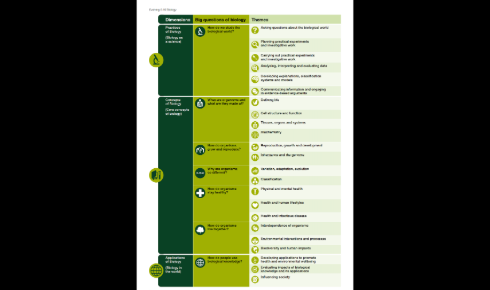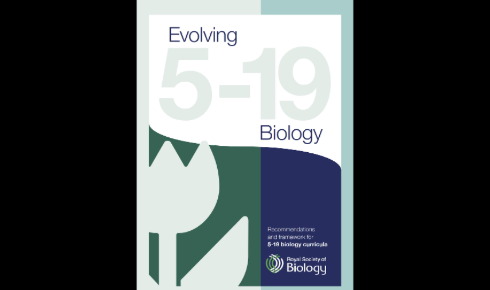Biology for a better world

8 September 2025
Neil Ingram on the opportunity to reform biology curricula for the better
A few weeks ago each of the UK’s 16-year-olds received their final GCSE or equivalent biology grades, finishing a journey that they have been making since the age of five. For most students this marks the end of their formal biology education and the beginning of a new chapter. The knowledge they have acquired over the years will be used to navigate the complexities of adulthood in the modern world. From understanding the intricate workings of their own bodies to grasping the delicate balance of ecosystems, this foundational knowledge will be essential.
We are living in a golden age of new discoveries in the life sciences. Each year more and more papers are produced, and we are experiencing deep revolutions in areas such as genomics and synthetic biology. Life science will be at the heart of efforts to fight global crises including biodiversity loss, climate change, pollution, age-related disease, food and water insecurity, and future pandemics. The prospect of being able to develop forms of artificial life is becoming ever more realistic.
In an era when information and misinformation coexist on social media, the school biology curriculum has a crucial role to play. It must equip young minds with the tools to discern fact from fiction, empowering them to make informed decisions about their health, their environment and the role of our species in the natural world.
Who decides what knowledge, understanding and skills are included in the five-to-16 learning journey (or five-to-19 for those students who decide to study at an advanced level)?
The RSB, as the unifying voice for biologists and biology education experts in the UK, is in a unique position to advise governments on what foundational knowledge is needed to understand the moral and technical complexities of tomorrow’s world.
Creating a curriculum
In the UK, education policy is devolved to each of the four home nations, which are responsible for forming relevant curricula, programmes of study, examinations and the awarding of qualifications. The devolved governments do this in association with independent regulatory bodies that oversee the activities of awarding bodies that set, mark and grade examinations.
Governments set the broad guidelines of what knowledge should be taught and the outline of how it should be assessed. The awarding bodies produce and implement detailed specifications that set out the courses of study. The regulatory bodies sit in the middle and ensure that the actions of the awarding bodies are coherent and in line with government directives. In Northern Ireland, Scotland and Wales there are single awarding bodies; in England there are multiple awarding bodies and the English regulator, Ofqual, ensures that the actions of the awarding bodies are equivalent. This is especially important when it comes to awarding examination grades. It is imperative that no awarding body is ‘easier’ or ‘harder’ than the others.
At times of curriculum reform, governments seek the opinions of trusted stakeholders, including curriculum experts, schools (and academy trusts in England) and parents. The relevant learned societies for each subject are invited to make contributions at this stage.
 The three dimensions are then subdivided into seven ‘big questions’, which are, in turn, subdivided into 23 themes (click to enlarge)
The three dimensions are then subdivided into seven ‘big questions’, which are, in turn, subdivided into 23 themes (click to enlarge)
Positive change
We are currently in an unprecedented phase of curriculum review, with each of the four home governments seeking to examine what is taught in their schools. The RSB is well placed to advise, having published a comprehensive framework and set of recommendations and policy positions for future curricula reform in 2021, known as the Evolving 5-19 Biology curriculum framework.
Lauren McLeod, head of education policy at the RSB, says the Society has been preparing for the latest rounds of curriculum and qualification reforms in England since the last reforms in 2014. She says: “This is an opportunity to make positive change in the education system to improve the teaching, learning and assessment of biology and the sciences, and ensure that the science curriculum and qualifications pathways are inspiring, relevant and manageable throughout the learning journey of all students.
“The purpose of qualifications in the sciences should be to prepare students either as non-scientist citizens or potential scientists progressing through technical, vocational and academic routes.”
Evolving 5-19 Biology was not a complete curriculum, but rather a roadmap of what a successful biology curriculum should look like for students aged from five to 19 years. A roadmap tells us where we are in our journey in biology, from where we have travelled to where we are going.
 In 2021, the RSB published a comprehensive framework and set of recommendations and policy positions for future curricula reform known as the Evolving 5-19 Biology curriculum framework
In 2021, the RSB published a comprehensive framework and set of recommendations and policy positions for future curricula reform known as the Evolving 5-19 Biology curriculum framework
The RSB’s biology curriculum committee was chaired by Professors Libby John (2014–2018) and Jeremy Pritchard (2019–2024). It contained representatives with experience of biology curriculum development, science education research, assessment and authoring textbooks, as well as primary and secondary biology teachers, and professionals from bioscience higher education and industry.
The final framework draws on best practice in biology and science education from across the world. It has been reviewed and discussed with the Society’s diverse membership and with biology students now in university education. Evolving 5-19 Biology is a collection of documents – including summary documents intended for teachers, policymakers and awarding bodies – and explorations of specific areas of curriculum and qualifications – for example, practical activities, the importance of ecology, transferable skills and sustainability education.
3D biology
The RSB’s vision of biology is a practical one: our ideas about the natural world arise by asking questions, making observations and carrying out experiments and investigations. Biological knowledge empowers people to develop applications that improve the lives of individuals and benefit society. And a biology curriculum should entitle students to study the practices and applications of biology as well as its core knowledge and concepts. The framework also recommends that “the biology curriculum should provide ample opportunities to engage in practical and investigative work, including in the field”.
To facilitate this, the curriculum is developed along three dimensions: the practices of biology, concepts of biology and applications of biology. These are helpfully subtitled: biology as a science, core concepts of biology and biology in the world. Some ideas in biology fit into only one of these dimensions. Other ideas, such as a study of Edward Jenner’s development of a smallpox vaccine, are valuable because they span the three dimensions.
The three dimensions are then subdivided into seven ‘big questions’, which are, in turn, subdivided into 23 themes. The biology curriculum should aim to develop students’ understanding of big ideas in biology, to help answer big questions about the biological. It should provide students of all ages with ample opportunities to learn about plants and other organisms in addition to humans and animals.
While many of the dimensions, big questions and themes will be familiar to students of biology across the world, the ‘defining life’ theme, within the big question, ‘what are organisms and what are they made of?’, is more innovative. It entitles students to be taught the functional, structural and philosophical ideas that underpin biologists’ understanding of the nature of life, which is vital for students living in a technological world where organisms with novel characteristics are ‘engineered’ in laboratories and where entirely novel organisms might one day be synthesised artificially.
Building the journey
The learning journey of students aged from five to 19 should be smooth and coherent. New ideas should build on existing comprehension and only be introduced when learners are mature enough to understand them. For each theme, the framework builds pathways of progression for students as they age. These do not form a detailed curriculum, but are criteria by which knowledge can be assessed for inclusion in a new curriculum. To what extent does a piece of knowledge help us to understand or answer the ‘big question’? Only ideas that ‘earn their place’ in the curriculum should be included.
Above all, the curriculum needs to be clear, teachable and assessable, while allowing for scope for innovation in delivery. Curriculum development is expensive and time-consuming, so any new curriculum aims to be contemporary, yet durable. The Evolving 5-19 Biology framework should help governments, regulators and awarding bodies achieve their aims, and we look forward to continuing to engage with the reforms across the UK.
The RSB continues to expand the suite of documents related to its curriculum recommendations, all available online.
Dr Neil R Ingram is a former member of the RSB Biology Curriculum Committee and author of the blog storiesfromnowherewood.co.uk


